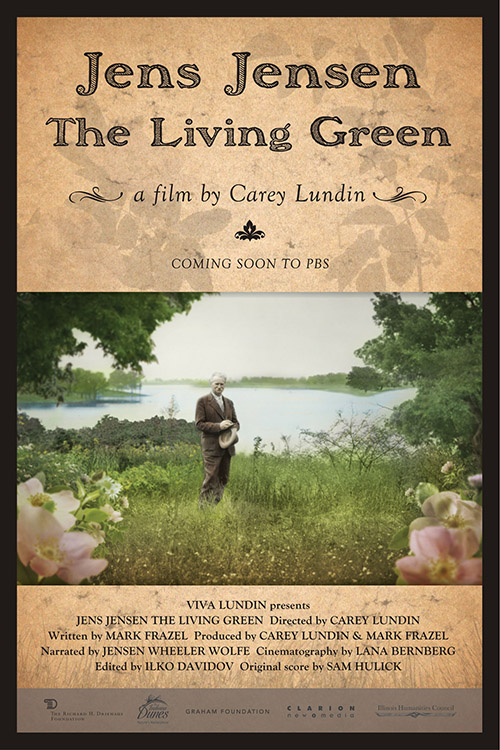
A screening of the documentary film Jens Jensen: The Living Green will be shown at noon Friday, April 21, in Ken and Linda Sue Shollmier Hall, Room 250 of Vol Walker Hall, on the University of Arkansas campus.
The Department of Landscape Architecture in the Fay Jones School of Architecture and Design is hosting this special Earth Day Eve lunchtime screening of the award-winning film. A discussion with the film's director and co-producer, Carey Lundin, will follow at 1 p.m. in Room 210. Pizza will be provided by the student chapter of the American Society of Landscape Architects.
This feature documentary, which aired on PBS stations nationwide, explores Jensen, the Prairie Style landscape architect and the Midwest's first great conservationist. A native of Denmark, Jensen (1860-1951) was responsible for the design of much of Chicago's parkland, including Columbus, Humboldt, Garfield and Douglas parks, as well as 600 more parks throughout the Midwest. The film captures the early battles over land for parks between Jensen and titans of industry, Chicago political machine bosses and corrupt park district leaders. The New York Times called Jensen "the dean of American landscape architecture."
Jensen came to the United States from Denmark seeking a second chance — to marry the woman he loved, to make a life and to make a difference. He dedicated his life to making the modern city livable by championing the preservation of our greatest natural areas and for equal access for all citizens. His philosophy was entirely democratic — parks and the living green need to be close to all people, regardless of race or income. All citizens deserve the right to be near nature. He felt then, as we do today, that nature creates community, a stronger sense of self-reliance, easy access to food, decreased obesity rates and, most of all, sanity.
Jensen's greatest act, which made him the nation's most relevant and unsung conservation hero, was stopping the industrialization of the entire Indiana shoreline, which eventually became a national park. Jensen used his art and entertainment as activism: He staged the 1914 Pageant of the Dunes, in which 1,000 actors portrayed the history of the land to 70,000 in what would become a combination of Woodstock, Earth Day and Lawrence of Arabia all rolled into one.
Since its release in 2013, Jens Jensen: The Living Green has received much recognition, including the Medal of Honor from The Explorers Museum; Hugo Awards from the Chicago International Film Fest; an Audience Award from the Green Bay Film Festival; and Best Director, Best Feature Documentary, Best Feature Documentary Director, Best Documentary Editing, and Best Documentary Music from the Wild Rose Independent Film Festival. Recent film screenings include World Environment Day at the Chicago Botanic Garden; The Explorers Museum Summit Weekend in Tullamore, Ireland; the 50th Anniversary of the Missouri Prairie Foundation in St. Louis; The Clearing in Door County, Wisconsin; Rhode Island ASLA Meeting; and the National Building Museum in Washington, D.C.
Lundin is well known for her ability to produce both comedy and drama, from hard-hitting political spots to emotional public service, from mockumentary webisodes to television programs. Since the release of Jens Jensen: The Living Green in 2013, Lundin has been invited to speak at 25 museums, universities, festivals and conferences about the project. Lundin is currently making a new film about a garden in Chicago's Little Village neighborhood called "Jardincito" (Little Garden), which looks at how adding a nature play park in the city's most park poor neighborhood affects the community. It picks up where Jensen left off, as it is just a few blocks from Jensen's Douglas Park — and almost inaccessible due to gang violence.
The public is invited to attend. Admission is free, with limited seating.
For more information, contact 479-575-4704 or fayjones.uark.edu.
Topics
Contacts
Michelle Parks, director of communications
Fay Jones School of Architecture and Design
479-575-4704,